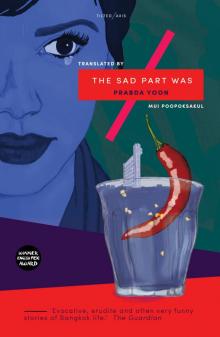- Home
- Prabda Yoon
The Sad Part Was Page 12
The Sad Part Was Read online
Page 12
Rapid modernisation paved the way for both hyper-nostalgia and hyper-curiosity about the new, and Prabda captures both of these impulses through his youthful narrators, who often recall their childhoods. The historical moment gave the author his perfect setup: the lightness of the national mood made experimentation in form possible, as the need to convey ideological messages faded into the background. Meanwhile, the lives of many Thais were moving further and further away from the rice paddies romanticised in much of the existing literature.
Prabda’s arrival – and his influence – ushered in an era of Thai literature that broke away from realism. His stories demand to be perceived as texts, insisting on their own self-contained universes made up of words and letters. Punctuation takes on a life of its own, despite its usage being relatively rare in Thai (and mostly imported). Wordplay is another of Prabda’s trademarks, drawing attention to the fact that any given language is a game with its own internal logic – a challenge for the translator, who attempts to recreate his moves in a language where the rules are different.
For example, Prabda plays with the fact that Thai does not generally use spaces between words. Meanings can therefore multiply because there are instances where two words next to each other have independent meanings on their own, while also forming a compound whose meaning can be completely unrelated to those of its component words. There is มดเท็จ (“mod-tej”) in “Pen in Parentheses,” for instance: as a whole, it means “to lie,” but มด (“mod”) alone means “ant” (symbolising smallness in Thai) and เท็จ (“tej”) means “false.” I turned these ants into bees in the translation, to keep the word game that the narrator relies on for his absurd line of reasoning.
Prabda also has fun with Thai names, particularly nicknames, which often have immediately apparent meanings. Many of them will seem silly to non-Thais – Duck, Melon, and Rat are perfectly normal nicknames. In “A Schoolgirl’s Diary,” two of the teachers are called “Moo” (meaning “Pig”); another is called “Mod” (the same word for “ant” again) so the kids nickname her “Mod X,” the Thai title of the Japanese manga series “Kamen Rider X.” In rendering the humour here, I had to break the usual rule of not translating or changing names.
I hope I have done Prabda’s wit sufficient justice, so that readers of the translation will get a good taste of his style. I also hope that the Bangkok obliquely represented in these stories will come alive for the reader as it does for me, as the city of those days is the one I always come home to.
Copyright © Prabda Yoon 2000
Translation copyright © Mui Poopoksakul 2017
This edition first published in the United Kingdom by Tilted Axis Press in 2017.
tiltedaxispress.com
First published in Thai as ความน่าจะเป็น (Kwam Na Ja Pen) by Amarin Printing and Publishing Public Company Limited in 2000.
‘Found’ and ‘Marut by the Sea’ were first published in Two Lines, ‘Pen in Parentheses’ in Asymptote, and ‘Ei Ploang’ in Words without Borders.
The rights of Prabda Yoon to be identified as the author and Mui Poopoksakul as the translator of this work have been asserted in accordance with Section 77 of the Copyright, Designs and Patent Act 1988.
This is a work of fiction. Names, characters, places and incidents are either the product of the author’s imagination or are used fictitiously. Any resemblance to any actual persons, living or dead, events or locales is entirely coincidental.
ISBN (paperback)9781911284062
ISBN (ebook)9781911284079
A catalogue record for this book is available from the British Library.
Edited by Deborah Smith
Typesetting and ebook production by Simon Collinson
This book has been selected to receive financial assistance from English PEN’s “PEN Translates!” programme, supported by Arts Council England. English PEN exists to promote literature and our understanding of it, to uphold writers’ freedoms around the world, to campaign against the persecution and imprisonment of writers for stating their views, and to promote the friendly co-operation of writers and the free exchange of ideas. www.englishpen.org
About Tilted Axis Press
Founded in 2015 and based in Sheffield and London, Tilted Axis is a not-for-profit press on a mission to shake up contemporary international literature.
Tilted Axis publishes the books that might not otherwise make it into English, for the very reasons that make them exciting to us – artistic originality, radical vision, the sense that here is something new.
Tilting the axis of world literature from the centre to the margins allows us to challenge that very division. These margins are spaces of compelling innovation, where multiple traditions spark new forms and translation plays a crucial role.
As part of carving out a new direction in the publishing industry, Tilted Axis is also dedicated to improving access. We’re proud to pay our translators the proper rate, and to operate without unpaid interns.
We hope you find this fantastic book as thrilling and beguiling as we do, and if you do, we’d love to know.
tiltedaxispress.com
@TiltedAxisPress

 The Sad Part Was
The Sad Part Was